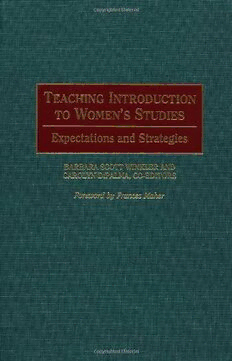Download Teaching Introduction to Women's Studies: Expectations and Strategies PDF Free - Full Version
Download Teaching Introduction to Women's Studies: Expectations and Strategies by Barbara Scott Winkler, Carolyn DiPalma in PDF format completely FREE. No registration required, no payment needed. Get instant access to this valuable resource on PDFdrive.to!
About Teaching Introduction to Women's Studies: Expectations and Strategies
This edited collection addresses the institutional context and social issues in which teaching the women's studies introductory course is embedded and provides readers with practical classroom strategies to meet the challenges raised. The collection serves as a resource and preparatory text for all teachers of the course including experienced teachers, less experienced teachers, new faculty, and graduate student teaching assistants. The collection will also be of interest to educational scholars of feminist and progressive pedagogies and all teachers interested in innovative practices.The contributors discuss the larger political context in which the course has become a central representative of women's studies to a growing, although less feminist-identified, population. Increased enrollments and changes in student population are noted as a result, in part, of the popularity of Introduction to Women's Studies courses in fulfilling GED and diversity requirements. New forms of student resistance in a climate of backlash and changes in course content in response to internal and external challenges are also discussed. Evidence is provided for an emerging paradigm in the conceptualization of the introductory course as a result of challenges to racism, heterosexism, and classism in women's studies voiced by women of color and others in the 1980s and 1990s. Sensationalist charges that women's studies teachers, including those who teach the Introduction to Women's Studies course, are the academic shock troops of a monolithic feminism are challenged and refuted by the collection's contributors who share their struggles to make possible classrooms in which informed dialogue and disagreement are valued.
Detailed Information
| Author: | Barbara Scott Winkler, Carolyn DiPalma |
|---|---|
| Publication Year: | 1999 |
| ISBN: | 9780313002106 |
| Pages: | 287 |
| Language: | English |
| File Size: | 1.248 |
| Format: | |
| Price: | FREE |
Safe & Secure Download - No registration required
Why Choose PDFdrive for Your Free Teaching Introduction to Women's Studies: Expectations and Strategies Download?
- 100% Free: No hidden fees or subscriptions required for one book every day.
- No Registration: Immediate access is available without creating accounts for one book every day.
- Safe and Secure: Clean downloads without malware or viruses
- Multiple Formats: PDF, MOBI, Mpub,... optimized for all devices
- Educational Resource: Supporting knowledge sharing and learning
Frequently Asked Questions
Is it really free to download Teaching Introduction to Women's Studies: Expectations and Strategies PDF?
Yes, on https://PDFdrive.to you can download Teaching Introduction to Women's Studies: Expectations and Strategies by Barbara Scott Winkler, Carolyn DiPalma completely free. We don't require any payment, subscription, or registration to access this PDF file. For 3 books every day.
How can I read Teaching Introduction to Women's Studies: Expectations and Strategies on my mobile device?
After downloading Teaching Introduction to Women's Studies: Expectations and Strategies PDF, you can open it with any PDF reader app on your phone or tablet. We recommend using Adobe Acrobat Reader, Apple Books, or Google Play Books for the best reading experience.
Is this the full version of Teaching Introduction to Women's Studies: Expectations and Strategies?
Yes, this is the complete PDF version of Teaching Introduction to Women's Studies: Expectations and Strategies by Barbara Scott Winkler, Carolyn DiPalma. You will be able to read the entire content as in the printed version without missing any pages.
Is it legal to download Teaching Introduction to Women's Studies: Expectations and Strategies PDF for free?
https://PDFdrive.to provides links to free educational resources available online. We do not store any files on our servers. Please be aware of copyright laws in your country before downloading.
The materials shared are intended for research, educational, and personal use in accordance with fair use principles.

